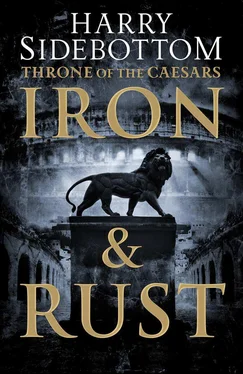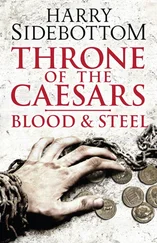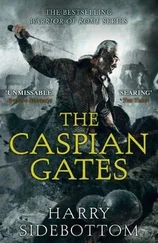Harry Sidebottom - Iron and Rust
Здесь есть возможность читать онлайн «Harry Sidebottom - Iron and Rust» — ознакомительный отрывок электронной книги совершенно бесплатно, а после прочтения отрывка купить полную версию. В некоторых случаях можно слушать аудио, скачать через торрент в формате fb2 и присутствует краткое содержание. Год выпуска: 2014, Издательство: HarperCollins Publishers, Жанр: Исторические приключения, на английском языке. Описание произведения, (предисловие) а так же отзывы посетителей доступны на портале библиотеки ЛибКат.
- Название:Iron and Rust
- Автор:
- Издательство:HarperCollins Publishers
- Жанр:
- Год:2014
- ISBN:нет данных
- Рейтинг книги:4 / 5. Голосов: 1
-
Избранное:Добавить в избранное
- Отзывы:
-
Ваша оценка:
- 80
- 1
- 2
- 3
- 4
- 5
Iron and Rust: краткое содержание, описание и аннотация
Предлагаем к чтению аннотацию, описание, краткое содержание или предисловие (зависит от того, что написал сам автор книги «Iron and Rust»). Если вы не нашли необходимую информацию о книге — напишите в комментариях, мы постараемся отыскать её.
Iron and Rust — читать онлайн ознакомительный отрывок
Ниже представлен текст книги, разбитый по страницам. Система сохранения места последней прочитанной страницы, позволяет с удобством читать онлайн бесплатно книгу «Iron and Rust», без необходимости каждый раз заново искать на чём Вы остановились. Поставьте закладку, и сможете в любой момент перейти на страницу, на которой закончили чтение.
Интервал:
Закладка:
Balbus squirmed with indecision.
‘If we hesitate, it will be too late,’ Licinius Serenianus said.
‘Yes, I suppose so. I suppose you are right.’ Balbus took a deep breath. ‘Very well. Although my own province could be invaded at any time, I think I could spare perhaps two thousand legionaries and a matching number of other troops.’
‘Ardashir and the bastard line of Sasan can never be secure on their stolen throne until they have murdered the last of the Arsacid house,’ Chosroes said. ‘My father, Tiridates of Armenia, the rightful King of Kings, promises ten thousand horsemen to fight the pretender.’
The vehemence of the statement, and the scale of the commitment, drew a murmur of appreciation.
‘My father Sanatruq lost his first born to the Sassanid,’ Ma’na said. ‘Although surrounded by the enemy, Hatra will send two thousand riders.’
‘Rome will not forget such loyalty,’ Priscus said. ‘An army of over thirty thousand experienced soldiers and warriors, it would be hard for any foe to resist.’ He stopped.
As if on cue, Licinius Serenianus spoke. ‘Imagine what it might achieve, if the Persian menace were to recede.’
There it was, almost out in the open.
‘When I was a captive of the Persians, I was taken into the presence of Ardashir.’ The disinherited Prince of Edessa narrowed his kohl-lined eyes. ‘The Sassanid released me to carry a message. Ardashir said he would withdraw his men, if the cities of Singara and Nisibis were handed over to his rule.’
Timesitheus made himself sit very still. So that was how it was to be done. Priscus, ever the pragmatist, would sacrifice two of the cities of his province. But who would put on the purple? Not Priscus himself; not another equestrian. Otacilius Severianus, his senatorial brother-in-law, was weak enough to make a pliable tool. No, it would have to be the capable Licinius Serenianus. It would not be ambition in the mind of the earnest governor of Cappadocia. No doubt he had convinced himself he had been summoned to shoulder a heavy responsibility for the good of the Res Publica .
‘The Persian reptile is a liar,’ Chosroes said. ‘He will not be satisfied with two towns.’
‘He has said he will take all the lands as far as the Aegean.’ Junius Balbus sounded thoroughly alarmed.
Surely, Timesitheus thought, the fat fool had seen this coming when the meeting was proposed. Everything hung in the balance.
‘Should the other forces be called away,’ Chosroes said, ‘the warriors of Armenia will continue the fight against the Sassanids.’
‘Hatra is too hard-pressed for her men to leave Mesopotamia,’ Ma’na said.
Priscus and Licinius Serenianus should have made sure of them beforehand, Timesitheus thought. The thing was slipping away.
‘Perhaps we should discuss where and when our forces should muster against the Persians,’ Junius Balbus said.
‘The Euphrates crossing at Zeugma would be the obvious place.’ Otacilius Severianus joined in eagerly. ‘But supplying such a force will pose many difficulties, especially when it leaves the river.’
There was a pause before Priscus spoke. ‘Materials can be taken by boat to Zeugma. Beyond that, we will need to establish stockpiles in Edessa and Batnae.’
It was over. Priscus and Licinius Serenianus, with the connivance of the Edessan Manu, had brought them to the brink, but had failed to lead either the irresolute Roman governors or the scions of local dynasties to make the dangerous leap. Now they would all have to hope the approach would not be seen as treason in itself. If anyone present turned informer, he would implicate himself.
The talk turned to the intricacies of logistics. As a man with experience in the field, Timesitheus made several contributions. After a time, he looked away, and found himself staring into the marble eyes of Bion of Borysthenes. Next to that philosopher was Aristotle. The old Kings of Commagene had liked their Hellenic culture organized alphabetically.
Timesitheus was relieved. Tranquillina would be disappointed. But he knew that, without her by his side, he lacked the stomach for open rebellion. His talents lay in other areas, in more indirect paths. One door shuts, and another opens. This coming winter he would travel to the neighbouring province of Asia to discuss city finances with its governor, Valerius Apollinaris. One of the sons of Apollinaris had been married to Alexander’s sister. No doubt the old man was still mourning his execution. Over dinner, with plenty of drink, and sympathetic company, it would be surprising if he did not express a certain rancour, say things which, if reported to the throne, he might regret. It was evident that the man was not to be trusted. There was a history of treason in his family.
CHAPTER 26
The Northern Frontier
The Town of Sirmium,
Two Days after the Ides of October, AD236
One of the advantages of a second marriage was the removal of some of the rituals. It would have been farcical for Iunia Fadilla to have feigned the terror of a Sabine girl about to be raped as she was pulled from the arms of her mother, let alone for her to dedicate her toys and child’s dress to her household gods. Anyway, her mother was dead, and this house in Sirmium was not her home.
It had struck her as high-handed that the owners of this house, solid citizens of this remote, cold northern town, had been summarily turned out. Not that they had seemed to mind. The opposite, in fact. They had said that they were honoured and hoped the Emperor’s daughter-in-law would remember them fondly. Actually, Iunia Fadilla had already forgotten their names.
A maid passed her a mirror. Iunia Fadilla disliked what she saw. A second marriage did not get rid of all the ancient customs. That morning her women had parted her hair with a bent spearhead, rusty with the blood of a slain gladiator. Then they had pulled and scraped her curls into six tight locks. They had bound these with woollen fillets into a tall cone and placed a wreath of marjoram around their creation. She looked like a sacrificial animal, an offering to some outlandish deity.
The rest of her costume was more pleasing: a plain white tunic with a flame-coloured veil and matching shoes. A girdle cinched her waist tight, emphasizing her hips and breasts. The metal collar around her neck almost hinted of servitude. The bridal outfit was meant only to be worn once. Old Nummius had found the combined suggestions of innocence and bondage irresistible. Although she had demurred at the ritual coiffure, and some of his stranger suggestions, her first husband had persuaded her to wear the rest on many less public occasions.
Iunia Fadilla stood in the atrium with her bridesmaids. The girls were the daughters of the inner circle of the imperial court. Chief among them was Flavia Latroniana. Her father was an ex-Consul the regime wished to conciliate. Iunia Fadilla knew her no better than the others. Only two members of her own family were present. Her cousin Lucius was off to one side. Looking awkward, he stood with a distant kinsman called Clodius Pompeianus, another descendent of Marcus Aurelius. Eunomia lurked at the back. As ever, her old nurse had a hand pressed to her chest, mumbling prayers.
Three pages led Maximus into the house. They were followed by his father. The Emperor would fulfil the role of auspex . Behind came a horde of men of high standing. Flavius Vopiscus, Catius Clemens, the Praetorian Prefect Anullinus, many others; most were accompanied by their wives. The latter, along with the bridesmaids, had been rushed to the North inauspiciously, in the closed carriages more usually employed conveying prisoners to the same destination.
Since the army had returned from its interrupted campaign in Dacia, Iunia Fadilla had seen Maximus on several occasions. He was young, no older than her, and he was tall, well proportioned. There was no denying his beauty, and he spoke both Latin and Greek in the tones of an educated man. Beyond that, she could say little about him. Of course, they had never been alone, and her betrothed had given no indication that such a state of affairs irked him.
Читать дальшеИнтервал:
Закладка:
Похожие книги на «Iron and Rust»
Представляем Вашему вниманию похожие книги на «Iron and Rust» списком для выбора. Мы отобрали схожую по названию и смыслу литературу в надежде предоставить читателям больше вариантов отыскать новые, интересные, ещё непрочитанные произведения.
Обсуждение, отзывы о книге «Iron and Rust» и просто собственные мнения читателей. Оставьте ваши комментарии, напишите, что Вы думаете о произведении, его смысле или главных героях. Укажите что конкретно понравилось, а что нет, и почему Вы так считаете.












